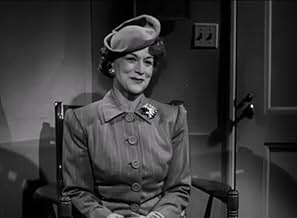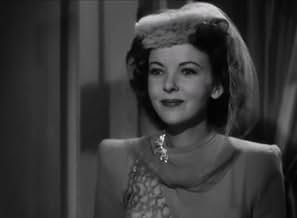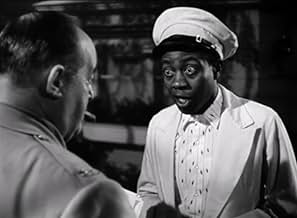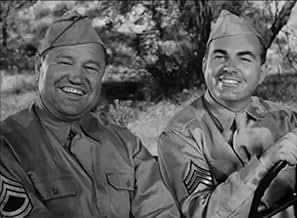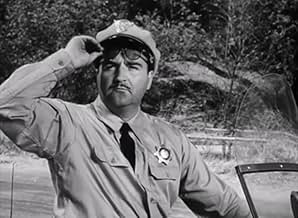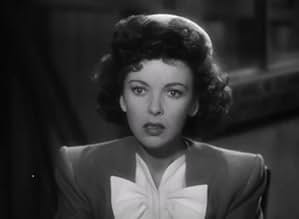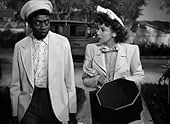Ajouter une intrigue dans votre langueA traveling saleswoman convinces an army lieutenant to pose as her husband so that she can rent an apartment during the World War II housing shortage.A traveling saleswoman convinces an army lieutenant to pose as her husband so that she can rent an apartment during the World War II housing shortage.A traveling saleswoman convinces an army lieutenant to pose as her husband so that she can rent an apartment during the World War II housing shortage.
- Réalisation
- Scénario
- Casting principal
- Récompenses
- 2 victoires au total
Louis Armstrong
- Louis Armstrong
- (non crédité)
Lynn Baggett
- Disgruntled Traveler
- (non crédité)
Leah Baird
- Sailor's Mother
- (non crédité)
Robert Blake
- Wilbur
- (non crédité)
Eddy Chandler
- Oil Well Foreman
- (non crédité)
Pat Clark
- Sergeant's Girl
- (non crédité)
Joyce Compton
- Gertrude Wilson
- (non crédité)
Avis à la une
This wartime romcom is about Jean Howard (Ida Lupino), the daughter of an oilfield supplies company owner. Though she is feminine and delicate, she volunteers to handle field sales and sets off to deal with roughnecks out west. This fish out of water story is secondary to the humor that evolves from a falsehood she employs.
She needs a room to operate out of, but like almost every other commodity, rooms are scarce and (practically) rationed. Out of necessity, she pretends to be the wife of an army lieutenant to get accommodations in an auto court. Then she sets off to find a lieutenant to play along with her charade. She finds Don Mallory (William Prince), who becomes trapped in her lie.
Lupino and Prince have excellent chemistry. This is a cute film that is well written. Though its stage play roots are evident, the screenplay is very entertaining. It also does a good job of demonstrating wartime exigencies and the resulting culture.
Willie Best plays the role of Lucille, the all-purpose fixit-man and gopher for the auto court. He is mystified by some of the goings-on that surround the Mallory household. Though his part may be seen as stereotypical, he rises above it and delivers many of the best lines of comedy.
Watch for Sydney Greenstreet as a commanding officer and Louis Armstrong who performs with his band.
She needs a room to operate out of, but like almost every other commodity, rooms are scarce and (practically) rationed. Out of necessity, she pretends to be the wife of an army lieutenant to get accommodations in an auto court. Then she sets off to find a lieutenant to play along with her charade. She finds Don Mallory (William Prince), who becomes trapped in her lie.
Lupino and Prince have excellent chemistry. This is a cute film that is well written. Though its stage play roots are evident, the screenplay is very entertaining. It also does a good job of demonstrating wartime exigencies and the resulting culture.
Willie Best plays the role of Lucille, the all-purpose fixit-man and gopher for the auto court. He is mystified by some of the goings-on that surround the Mallory household. Though his part may be seen as stereotypical, he rises above it and delivers many of the best lines of comedy.
Watch for Sydney Greenstreet as a commanding officer and Louis Armstrong who performs with his band.
Pillow To Post has Ida Lupino working for her dad Paul Harvey's oil drilling
supply company because his sales force have all been drafted. She has to
sell John Mitchell the company supplies and get a signed order.
But with wartime housing being what it is, the only room she can find is at a motel court built for GIs and their dependents. Fortunately she finds a nice lieutenant in William Prince to take on the role of husband.
I'm sure you know that love will bloom as it always does in these movies. The wartime housing shortage was always a good subject for comedy, the best known being The More The Merrier.
Lupino is quite frazzled in her role, but all to good effect. William Prince is an officer and a gentleman always. Nice supporting cast headed by Sydney Greenstreet as Prince's commanding officer who is on a diet to lose weight so he can go overseas. I'm betting George C. Marshall wants his officers slim and trim for the front.
Pillow To Post is a nice wartime comedy that still holds up well.
But with wartime housing being what it is, the only room she can find is at a motel court built for GIs and their dependents. Fortunately she finds a nice lieutenant in William Prince to take on the role of husband.
I'm sure you know that love will bloom as it always does in these movies. The wartime housing shortage was always a good subject for comedy, the best known being The More The Merrier.
Lupino is quite frazzled in her role, but all to good effect. William Prince is an officer and a gentleman always. Nice supporting cast headed by Sydney Greenstreet as Prince's commanding officer who is on a diet to lose weight so he can go overseas. I'm betting George C. Marshall wants his officers slim and trim for the front.
Pillow To Post is a nice wartime comedy that still holds up well.
Ida Lupino stars as a saleslady working for her father's company. As it was during WWII, women were assuming many jobs held by men and Ida does this to help out with the war effort. However, she turns out to be pretty bad at sales and by the time she gets to one remote location, she's desperate. But things only get worse, as there is a military base nearby and so there are no spare hotel rooms. On a lark, she checks into a motel designated for spouses of servicemen. However, she's single and lies to get the room--and unless she wants to get tossed out, she'll have to find some guy to pose as her husband. The unsuspecting shmoe is a young lieutenant (William Prince)--whose nice gesture completely blows up in his face. And now, they are stuck together--otherwise the Lieutenant will be in serious trouble with his Colonel. Can all this be straightened out and Lupino and Prince avoid serious consequences?
This is a nice screwy comedy that was pretty timely--as there was a severe housing shorting during the war. In many ways, the theme is reminiscent of the wonderful comedy "The More the Merrier"--though this latter film is much more of a classic. "Pillow to Post", on the other hand, is rather slight...enjoyable but slight.
snafu
This is a nice screwy comedy that was pretty timely--as there was a severe housing shorting during the war. In many ways, the theme is reminiscent of the wonderful comedy "The More the Merrier"--though this latter film is much more of a classic. "Pillow to Post", on the other hand, is rather slight...enjoyable but slight.
snafu
This is about the first comedy film that I have ever seen Ida Lupino appear in and she was fantastic. Always knew Ida was multi-talented as an actress, director and producer. In this film Lupino (Jean Howard), "The Devil's Rain",'75, appears as a young gal who wants to work in her father's oil business and decides to become a traveling sales gal, which at the time was unspeakable in that type of business. Jean has to find a proper place to sleep on her travels, and since it was war time, she decided to get hold of a Lt. in the Army who would have living quarters for wives. This lucky Lt. was portrayed by William Prince, (Lt. Don Mallory), "Nuts",'87, who unwillingly helped Jean make this a reality. Another big shock in this film is the appearance of Sydney Greenstreet,(Col. Michael Otley), "Flamingo Road",'49 and of course, the "Maltese Falcon", with Humphrey Bogart. In this role Col. Otley is Don Mallory's Commanding Officer and they live together in the housing unit. It is a very enjoyable funny film and was probably a big shocker for people in 1945, it sure takes a person way back in the PAST.
Mildly amusing wartime programmer about housing shortage for service couples. Jean (Lupino) finagles an army officer (Prince) to pose as her husband so she can get restricted housing in a motel court. Naturally, "who sleeps where" type complications ensue as they work to keep up appearances. The pace picks up as the difficulties mount, ending finally in madcap farce.
The cast tries hard to make familiar material for the time work. Still, seams do show, especially with Lupino's sometimes over-eager performance. Clearly, she's anxious to show she's as good at comedy as she is at dramatics. Then too, when movie buffs think Greenstreet, comedy doesn't come to mind. But here he plays an unlikely over-weight colonel to pretty good effect. (Note how the script deals with this fudging of army fitness standards.)
The colorful mix of supporting characters includes a mischievous little Robert Blake, a busybody Ruth Donnelly, a bug-eyed Willy Best, and an addled Stuart Erwin. Together, they manage to keep the chuckles coming. The movie, however, doesn't rise to the first rank, perhaps because the elements don't blend into a seamless whole—you can almost see the characters and situations being assembled. Nonetheless, it's a generally entertaining glimpse into what titillated audiences coming out of the big war.
The cast tries hard to make familiar material for the time work. Still, seams do show, especially with Lupino's sometimes over-eager performance. Clearly, she's anxious to show she's as good at comedy as she is at dramatics. Then too, when movie buffs think Greenstreet, comedy doesn't come to mind. But here he plays an unlikely over-weight colonel to pretty good effect. (Note how the script deals with this fudging of army fitness standards.)
The colorful mix of supporting characters includes a mischievous little Robert Blake, a busybody Ruth Donnelly, a bug-eyed Willy Best, and an addled Stuart Erwin. Together, they manage to keep the chuckles coming. The movie, however, doesn't rise to the first rank, perhaps because the elements don't blend into a seamless whole—you can almost see the characters and situations being assembled. Nonetheless, it's a generally entertaining glimpse into what titillated audiences coming out of the big war.
Le saviez-vous
- AnecdotesThis was William Conrad's acting debut.
- GaffesNear the end of the film as Don starts to go after Jean, as the camera tracks him, its moving shadow falls across the back of someone standing in the foreground.
- Citations
Colonel Michael Otley: Lucille, everyone in the Army isn't a general.
Lucille: No, sir, but you'd be surprised how my tips increased after I started calling everyone general.
- Bandes originalesWhatcha Say?
(uncredited)
Music by Burton Lane
Lyrics by Ted Koehler
Performed by Dorothy Dandridge with Louis Armstrong and His Orchestra
[The orchestra performs the song at the Tavern]
Meilleurs choix
Connectez-vous pour évaluer et suivre la liste de favoris afin de recevoir des recommandations personnalisées
Détails
- Date de sortie
- Pays d’origine
- Langue
- Aussi connu sous le nom de
- ¡Qué noche de bodas!
- Lieux de tournage
- Wilshire Boulevard and South Alvarado Street, Los Angeles, Californie, États-Unis(cab goes through this intersection, driving on Wilshire, at beginning of film)
- Sociétés de production
- Voir plus de crédits d'entreprise sur IMDbPro
- Durée
- 1h 32min(92 min)
- Couleur
- Rapport de forme
- 1.37 : 1
Contribuer à cette page
Suggérer une modification ou ajouter du contenu manquant

